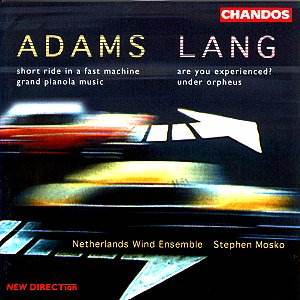Although their work is essentially rooted in the American
"minimalist school" John Adams and his younger compatriot
David Lang, have both striven to push the boundaries of their musical
language to open up new horizons. That said, there is no mistaking their
own, individual compositional voices.
Of the two composers, it is the music of David Lang
that I suspect will always divide opinion to the greater degree. Indeed,
the two works by Adams presented here have attained something of a cult
status, particularly in the case of Short Ride in a Fast Machine,
which must have received literally hundreds of performances in its first
few years of existence. Although I would not want to be without a recording
of the orchestral original of this work I have to say that this transcription
for wind band by Lawrence T. Odorn is finely done. More to the point,
when it is played with the kind of stunning virtuosity demonstrated
here by the Netherlands Wind Ensemble, it is irresistible. I have played
this performance over and over again and have still not tired of it.
Grand Pianola Music, conceived on an altogether
"grander" scale as the title suggests, receives an equally
mesmerising performance. It is easy to lose sight of how difficult this
music is to pull off and I found myself frequently marvelling at the
delicacy and perfectly graded balance of the playing and ensemble. At
a little over half an hour in length (the first movement alone accounts
for half of this) Adams never loses the listeners attention and manages,
against the odds some might say, to create an impressively convincing
feeling of being on a journey, resulting in a truly joyous and satisfying
conclusion. The scoring is for wind orchestra with the addition of three
sopranos, or "cooing sirens" as the composer puts it, and
two pianos. It is the slightly out of phase part for the two pianos
that creates the pianola imitation of the title, the pianos being used
to excellent effect in the final movement, On the Dominant Divide.
Everything that is to be admired about this performance is on display
in the opening minutes of the first movement. By the soprano entry just
before the five minute mark I was totally hooked and as a result have
already tagged this as something of a benchmark performance in my Adams
collection.
Anyone familiar with the music of Jimi Hendrix will
recognise Are You Experienced? as the title of both a song and
album by the late rock legend. As someone with little knowledge of Hendrix
I am uncertain as to whether David Lang quotes musically from the song
or not (I suspect not). There are certainly references in the spoken
narration however, notably at the conclusion of the work, "Dont
scream, Dont cry, Your world will let you go" Lang takes as his
premise the listener having experienced a blow to the head, the narration
subsequently guiding the listener through various states of consciousness.
Scored for an ensemble of single woodwind, brass, strings (minus violins),
keyboard, synthesiser and percussion, Lang adds an electric tuba here
played magnificently by Hendrik Jan Renes. Take a listen to the extraordinary,
electronically manipulated solo cadenza at the end of the section entitled
"Dance" for a fine example. Where Langs music clearly differs
from Adams' is in his conscious use of dissonance and certain avant-garde
techniques, albeit strictly controlled and within a broadly tonal framework.
Where Are You Experienced? is rhythmically dynamic
and dance like in its allusions to popular music, Under Orpheus
is far more static in conception, exploring one and two note tremolandos
in each of its two movements. An "expansion" of an earlier
work scored for two pianos alone, entitled Orpheus Over and Under,
here the pianos lead a double instrumental ensemble who take up and
extend the pitches and textures created by the pianos. For my money,
Are You Experienced? holds more interest although the performances
make for a rewarding listen in both cases.
In terms of longevity of appeal I have little doubt
that David Langs music is more likely to become a victim of stylistic
fashion than that of John Adams. Nevertheless, he is a composer with
something original to say and this disc represents an ideal opportunity
for listeners to make their own judgement on the artistic and philosophical
merits of his work. Either way, anyone with even a passing interest
in the music of Adams or Lang should not be without this disc. Both
the recordings and the performances are as fine as we are ever likely
to hear.
Christopher Thomas



 Netherlands Wind Ensemble conducted by Stephen Mosko
Netherlands Wind Ensemble conducted by Stephen Mosko